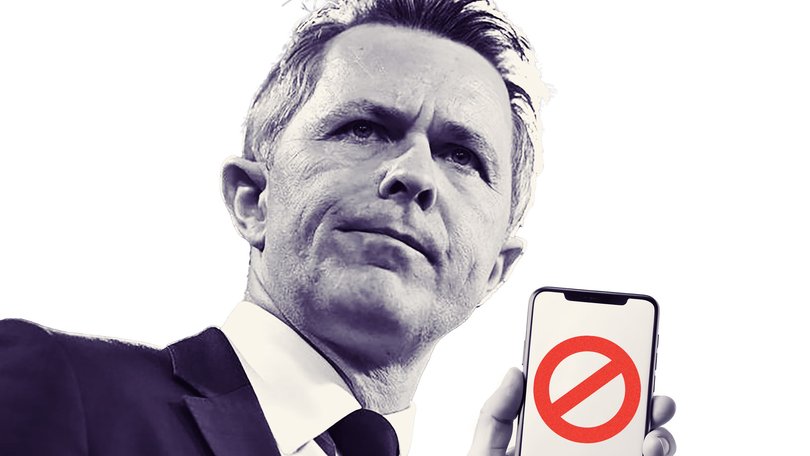JENI O’DOWD: Albanese Government’s proposed social media ban for teens will fail without parent action

Education Minister Jason Clare has outlined a sweeping agenda for his second term — and it ticks all the right political boxes.
In an exclusive interview with The Nightly last week, he discussed school funding, student debt relief, pay increases for early educators and a crackdown on bullying and gender-based violence.
He even floated the idea of showing the Netflix series Adolescence in high schools to highlight the toxic influence of online culture.
Sign up to The Nightly's newsletters.
Get the first look at the digital newspaper, curated daily stories and breaking headlines delivered to your inbox.
By continuing you agree to our Terms and Privacy Policy.It’s a solid to-do list. And in fairness, Clare’s not wrong when he says: “We’ve got a good education system in Australia, but it can be better.”
But what Clare, a father of two young boys, didn’t say, and what no politician ever quite admits, is that none of this will work if parents don’t step up.
Because no matter how many laws are passed, programs funded or reviews commissioned, the greatest threat to our kids isn’t a lack of government action. It’s the quiet indifference of adults who’ve stopped paying attention.
Take the much-publicised under-16 social media ban. Platforms such as TikTok, Instagram and Snapchat will be required to block accounts from users under 16 by the end of the year.
Clare has defended the move as a way to protect young people from the “cesspit” of online content fuelling misogyny, anxiety and violence.
But unless parents are prepared to act, it’s destined to fail.
For all the noise about dangerous algorithms and toxic influencers, the truth is that most parents have quietly surrendered to the convenience of screens.
We’ve all handed our kids a smartphone and hoped for the best. Toddler tantrum? Here’s an iPad. Tween in a sulk? Watch something. Teenager locked in their room? At least they’re not causing trouble.
There is no doubt that phones have become an essential part of modern parenting. But not because they’re essential, but because they’re easy.
The only way this ban will work is if parents ban smartphones entirely for under-16s, not just the apps. And that will never happen.
When schools ban phones, it’s often the parents who complain the loudest. “They need it to find me after school.” “What if they need money for the canteen?” “What if something happens?”
It sounds reasonable, until you remember that just a few years ago, kids survived an entire school day without texting their parents five times.
Every teen knows how to hide an app, fake their age or jump platforms faster than you can say “family dinner.”
These apps are addictive, and they’re how young people communicate. Snap streaks, group chats, reels. This is the teenage social scene.
Take it away, and they’ll rebel. But it’s also how they’re bullied, manipulated, groomed and fed a worldview where cruelty and humiliation are currency.
Tackling that world is one of Clare’s early priorities.
“This is a problem that schools grapple with,” he said, “but it’s bigger than schools. It’s a challenge for parents.
“It’s a responsibility of dads to make sure that our boys grow up the right way — but also that we don’t push our boys into the arms of people like Andrew Tate.”
This social media ban won’t work unless adults start behaving like adults. Say no. Mean it. Absorb the outrage. Live with being unpopular. That’s parenting.
He’s absolutely right. A 2023 study by US-based nonprofit Common Sense Media, which tracks media and tech use among children, found teens receive an average of 237 notifications a day. Some got up to 5000. That is mind-blowing.
And it’s not surprising, considering how young we give them their first device.
According to the Australian Communications and Media Authority, a third of children aged six to 13 already own a phone.
By 12 or 13, that figure jumps to over 75 per cent. And among teens aged 14 to 17, a Charles Sturt University study found that 91 per cent own a smartphone.
These devices are in their pockets, on their pillows and shaping their social lives long before they’re old enough to drive — or in many cases, even cross the street alone.
There are parents doing the hard yards. They monitor devices, talk to their kids, set boundaries and enforce them.
But they’re the exception. Most of us — and I include myself — have, at times, handed over the phone and hoped for the best.
Years ago, during a long Sunday lunch with friends, we gave the kids my iPad to keep them occupied.
They disappeared for hours. Months later, I found they’d made an entire movie on an app I’d never even heard of.
What they did was harmless, creative, even, but it was a reminder of how casually we hand over tech with no idea what’s really happening behind the screen.
This social media ban won’t work unless adults start behaving like adults. Say no. Mean it. Absorb the outrage. Live with being unpopular. That’s parenting.
Parenting is not posting about your kids’ screen-free Sunday while they’re locked in their bedrooms, secretly scrolling under the doona.
All credit to Jason Clare for setting the benchmark.
But don’t mistake policy for a plan. If this fails, it won’t be because social media companies found a loophole.
It’ll be because parents did.
